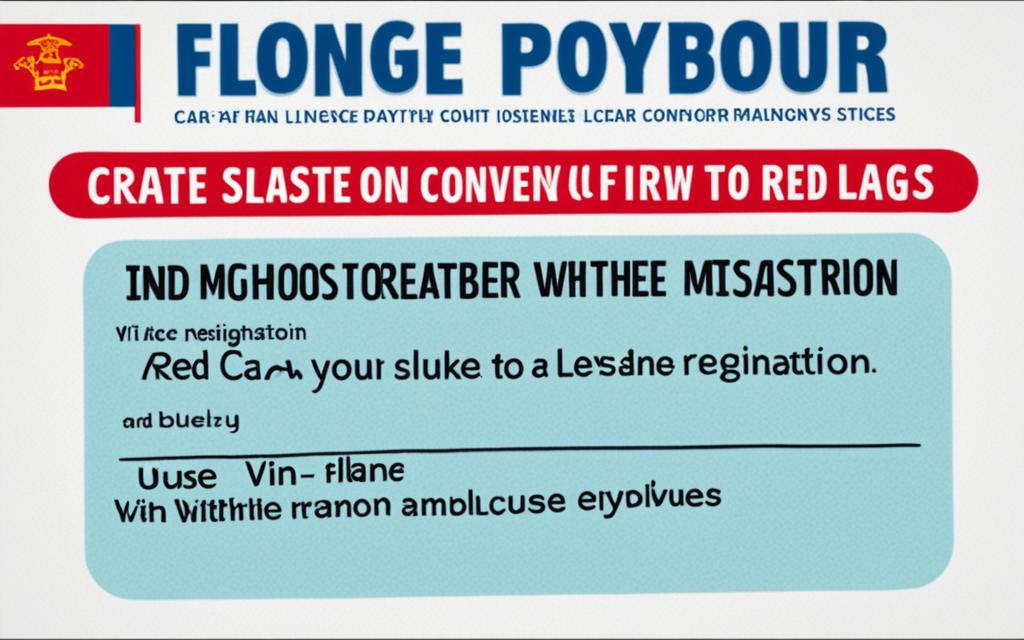When it comes to buying a car, there’s nothing more important than ensuring a safe and legitimate purchase. Unfortunately, car buying scams are becoming increasingly common, and it’s crucial to be able to spot the red flags. By being aware of the signs of a car purchase scam, you can protect yourself from falling victim to fraudulent deals. In this section, we will examine some of the key red flags to watch out for when buying a car, whether from a private seller or a dealership.
Key Takeaways:
- Research the seller or dealership to verify their credibility.
- Suspiciously low prices can be a sign of a scam.
- Be cautious of overly urgent sales tactics.
- Always verify the vehicle’s history.
- Insist on in-person inspections before finalizing the purchase.
Research the Seller or Dealership
When it comes to purchasing a car, a crucial step that should never be overlooked is researching the seller or dealership. By taking the time to verify their credibility, you can avoid potential scams and ensure a safe transaction.
Here are some tips to help you research car sellers effectively:
- Check online reviews: Look for reviews and ratings of the seller or dealership on reputable platforms such as Google, Yelp, or the Better Business Bureau. Pay attention to any recurring negative feedback or complaints.
- Verify their contact information: Make sure the seller or dealership provides a legitimate phone number and address. You can cross-reference this information with public directories or online maps to confirm its authenticity.
- Visit their website: Take a look at their official website, if available. Pay attention to professional design and clear contact information. A reputable seller will often provide detailed information about their inventory and services.
- Ask for recommendations: Seek recommendations from friends, family, or trusted car enthusiasts who have had positive experiences with car sellers. Their insights can be invaluable in guiding your decision.
- Beware of suspicious behavior: If a seller avoids providing essential details or becomes defensive when asked questions, it may be a sign of a potential scam. Trust your instincts and proceed with caution.
Remember, conducting thorough research on the seller or dealership is crucial to avoid falling victim to car scams. By verifying their credibility and recognizing any warning signs, you can make an informed decision and protect yourself from fraudulent practices.
| Research the Seller or Dealership | Benefits |
|---|---|
| Check online reviews | Identify potential red flags based on other customers’ experiences |
| Verify their contact information | Ensure the seller or dealership is legitimate and can be reached |
| Visit their website | Gather more information about their inventory and services |
| Ask for recommendations | Benefit from trusted insights and experiences |
| Beware of suspicious behavior | Stay vigilant against potential scams |
Suspiciously Low Prices
When it comes to purchasing a vehicle, it’s important to be cautious of suspiciously low prices. While a great deal can be enticing, it could also be a red flag for a car scam. In this section, we will explore the significance of comparing prices and understanding market value to avoid falling victim to a fraudulent deal.
Car scammers often use incredibly low prices as bait to lure unsuspecting buyers. They may advertise a vehicle at a price significantly below its market value to create a sense of urgency and excitement. However, remember that if it seems too good to be true, it probably is.
One way to protect yourself is by conducting thorough research and comparing prices of similar vehicles in the market. Understand the average price range for the type of car you are interested in and factor in variables such as mileage, condition, and year of manufacture.
Additionally, be cautious of sellers who are unwilling to negotiate or explain the reasons behind their low prices. They may be avoiding transparency for a reason, hoping to take advantage of unsuspecting buyers who are unaware of the vehicle’s true condition or hidden issues.
To illustrate the importance of comparing prices, here is a table showcasing the average market prices for popular car models:
| Car Model | Average Market Price |
|---|---|
| Honda Civic | $15,000 – $20,000 |
| Toyota Camry | $18,000 – $25,000 |
| Ford Escape | $20,000 – $25,000 |
| Chevrolet Silverado | $25,000 – $35,000 |
By familiarizing yourself with these average prices, you can identify any suspiciously low offers that fall significantly below the market value. Remember, it’s always better to spend a little extra for a legitimate purchase than to fall prey to a car scam.
Overly Urgent Sales Tactics
When it comes to car buying scams, scammers often utilize overly urgent sales tactics to pressure potential buyers into making quick decisions. By creating a sense of urgency and desperation, these scammers aim to capitalize on your emotions and cloud your judgment. It’s crucial to be aware of these signs and take your time to avoid falling into their trap.
One common tactic scammers use is claiming that the offer is only available for a limited time or that there are other interested buyers waiting in line. They may emphasize that you must act immediately to secure the deal, putting pressure on you to make a rash decision.
Another tactic is pushing for quick payment methods that don’t allow you to thoroughly research or inspect the vehicle. Scammers may insist on immediate wire transfers, cashier’s checks, or other methods that limit your ability to verify the legitimacy of the transaction.
Remember, a legitimate seller will understand and respect your need for time to make an informed decision. They will not employ high-pressure tactics or rush you into hasty choices. Take a step back, trust your instincts, and never feel compelled to rush into a deal.
“Act now or miss out on the deal of a lifetime!”
These are the words scammers often use to manipulate potential buyers. By recognizing these high-pressure sales tactics, you can protect yourself from being scammed and ensure a safe car purchase.
Taking Your Time: A Key Defense
When presented with an overly urgent sales pitch, it’s crucial to resist the pressure and take your time to make an informed decision. Here’s what you can do:
- Research and compare prices: Take the time to research and compare prices of similar cars in the market. If a deal seems too good to be true, it probably is.
- Verify the seller: Research the seller’s reputation, read reviews, and check their credibility. Legitimate sellers will have a transparent history and positive feedback from previous customers.
- Perform a thorough inspection: Insist on an in-person inspection of the vehicle. Don’t rely solely on pictures or descriptions provided by the seller.
- Consult a trusted mechanic: If you’re not confident in evaluating the car’s condition, seek the advice of a trusted mechanic. They can help identify potential issues or hidden damages.
By following these steps and staying vigilant against overly urgent sales tactics, you can protect yourself from car buying scams and make a safe and informed purchase.
| Signs of Overly Urgent Sales Tactics | How to Protect Yourself |
|---|---|
| The seller imposes limited-time offers or claims other potential buyers are waiting. | Take your time and don’t be rushed into making a decision. Legitimate sellers will give you the necessary time to evaluate the purchase. |
| The seller pushes for immediate wire transfers or other quick payment methods. | Always use secure payment methods that provide buyer protection. Never send money without verifying the seller’s credibility and the car’s condition. |
| The seller refuses to allow an in-person inspection or discourages rigorous scrutiny of the vehicle. | Insist on inspecting the car in person and have a trusted mechanic examine it. If the seller refuses, consider it a major red flag. |
| The offer seems too good to be true in comparison to other similar vehicles on the market. | Research and compare prices to ensure the deal is reasonable and not an attempt to scam you. If the price seems too low, question its legitimacy. |
Lack of Vehicle History
When purchasing a used car, one of the red flags to watch out for is a lack of vehicle history. Insufficient or unavailable vehicle history can indicate a potential scam or undisclosed issues with the vehicle. To spot car buying fraud and avoid falling victim to a car purchase scam, it’s crucial to verify the car’s history.
Verifying a car’s history can provide valuable insights into its past ownership, maintenance records, and any reported accidents. It allows you to make an informed decision and ensure the vehicle’s reliability. There are several ways you can verify a car’s history:
- Vehicle History Report: Obtain a vehicle history report from reputable sources like CARFAX or AutoCheck. These reports provide detailed information about the car’s title history, odometer readings, accident records, and more. Look for any discrepancies or inconsistencies that may indicate car buying fraud.
- Service Records: Request the seller to provide service records. These records document the car’s maintenance history, highlighting regular maintenance and potential issues that have been addressed. Lack of service records can be a sign of a car purchase scam.
- VIN Check: Conduct a VIN check through the National Motor Vehicle Title Information System (NMVTIS). This database allows you to access information on a car’s title history, theft records, and salvage history. Look for any red flags or discrepancies that may point to car buying fraud.
- Physical Inspection: Inspect the car thoroughly for any signs of hidden issues or damage. Check for mismatched paint, rust, or signs of repair, as these could indicate previous accidents that may not be disclosed in the vehicle history.
By taking the time to verify a car’s history and checking for any signs of car buying fraud, you can protect yourself from falling victim to a car purchase scam. Remember, knowledge is key when it comes to making a safe and informed purchase.
Avoiding In-Person Inspections
When buying a used car, it’s essential to inspect the vehicle in person before making a purchase. Avoiding in-person inspections can be a red flag and increase the risk of falling victim to car buying scams. Here’s why in-person inspections are crucial and how they can help you avoid potential pitfalls.

The Importance of In-Person Inspections
Inspecting a car in person allows you to assess its condition, identify any hidden problems, and verify its accuracy against the seller’s claims. It provides an opportunity to thoroughly examine the exterior, interior, engine, and other essential components.
“In-person inspections give buyers the chance to see the car’s true condition and ensure that it meets their expectations. It’s an essential step in the car buying process to avoid getting scammed.” – Car Buying Expert
Risks of Avoiding In-Person Inspections
By avoiding in-person inspections, buyers expose themselves to various risks, such as:
- Undisclosed mechanical issues
- Hidden damages or accidents
- Inaccurate vehicle descriptions
- Fraudulent sellers
In some cases, scammers may use excuses like distance or time constraints to discourage in-person inspections. However, a legitimate seller will always accommodate your request for an inspection.
Tips for a Successful In-Person Inspection
When conducting an in-person inspection, consider the following tips:
- Bring a trusted mechanic: If you’re not confident in evaluating a car’s condition yourself, bring a qualified mechanic to assist you.
- Take your time: Avoid rushing through the inspection process. Thoroughly examine the car and ask questions if something seems off.
- Check the paperwork: Verify the vehicle’s title, registration, and maintenance records to ensure their authenticity.
- Test drive the car: A test drive is essential to assess the vehicle’s performance and handling.
| Signs of a Legitimate Seller | Red Flags |
|---|---|
| The seller allows and encourages in-person inspections. | The seller insists on avoiding in-person inspections. |
| The seller provides accurate and detailed information about the car’s condition and history. | The seller is unwilling to provide necessary information or offers vague responses. |
| The seller has proper documentation, including the title and registration. | The seller lacks essential paperwork or provides suspicious documents. |
Remember, a legitimate seller will understand and support your decision to conduct an in-person inspection. If a seller refuses or makes excuses, it’s advisable to walk away and search for a more trustworthy seller.
Sketchy Payment Methods
When it comes to car buying scams, one of the red flags to watch out for is the use of sketchy payment methods. Scammers often insist on payment methods that lack transparency and protection, leaving unsuspecting buyers at risk of being ripped off. To ensure a safe and legitimate transaction, it’s crucial to be aware of the warning signs and know your secure payment options.
Here are some red flags associated with payment methods that should raise suspicions:
- Requests for wire transfers or money orders: Scammers may try to avoid traceable payment methods like credit cards or certified checks, opting instead for wire transfers or money orders. These methods offer little to no protection for the buyer and can be difficult to recover in the event of a scam.
- Pressure to pay upfront before receiving the vehicle: If the seller insists on full payment before you can even see the car or take it for a test drive, be cautious. Legitimate sellers understand the need for trust to be built through the proper inspection process and will not rush you into making a payment.
- Unusual payment gateways: Be wary of sellers who want to use unconventional payment methods or platforms that you’ve never heard of before. Stick to well-known and trusted payment gateways to ensure your transaction is secure.
Here’s a list of secure payment options you should consider when buying a car:
- Credit card: Paying with a credit card offers added protection due to consumer rights and the ability to dispute charges if necessary.
- Certified check: Using a certified check minimizes the risk of fraudulent activity as it ensures that the funds are readily available.
- Escrow service: An escrow service acts as a middleman between the buyer and seller, holding the payment until all conditions of the sale have been met.
- Online payment platforms: If possible, use well-established and reputable online payment platforms such as PayPal or Venmo, which provide buyer protection against scams and fraudulent sellers.
Remember, it’s essential to be cautious and vigilant when it comes to payment methods, as scammers will go to great lengths to deceive unsuspecting car buyers. By using secure and trusted payment options, you can protect yourself from falling victim to a car scam.
Title and Registration Issues
When it comes to buying a car, title and registration issues can serve as red flags for potential scams. It is crucial to verify and transfer ownership correctly to avoid facing legal and financial consequences. By understanding the importance of proper documentation, you can protect yourself and make a safe and legitimate purchase.
First and foremost, always check the title of the vehicle you plan to buy. Ensure that the seller’s name matches the name on the title, and cross-reference it with their identification document to confirm their identity. Any discrepancies or inconsistencies may indicate a scam.
“I thought I found the perfect car at an unbelievable price. However, when I checked the title, the seller’s name didn’t match. It raised suspicions, and I decided to walk away. It turned out to be an attempt at fraud, and I’m glad I didn’t fall for it.” – Amanda, experienced car buyer
In addition to verifying the title, it’s essential to double-check the vehicle’s registration. Ask the seller for the current registration documents and make sure they are up to date. Any expired or missing registrations could signal potential legal issues or hidden problems with the vehicle.
To ensure a smooth ownership transfer, follow the correct procedures in your state. This may involve completing a bill of sale, obtaining a release of liability form, or visiting the local Department of Motor Vehicles (DMV) to finalize the transfer. Familiarize yourself with the specific requirements and deadlines to avoid falling victim to a scam.
Steps to Verify and Transfer Ownership
| Steps | Actions |
|---|---|
| Check the title | Verify that the seller’s name matches the name on the title and confirm their identity. |
| Inspect the registration | Ensure the registration documents are current and not expired. |
| Complete necessary paperwork | Follow the correct procedures in your state, such as filling out a bill of sale and obtaining a release of liability form. |
| Visit the DMV | In some cases, you may need to visit the local DMV to finalize the ownership transfer. |
Being diligent about title and registration issues will help you avoid potential scams and protect your investment. Make sure to seek professional advice or consult local regulations if you have any doubts or concerns throughout the process.

No Test Drives or Inspections Allowed
When purchasing a vehicle, it is crucial to thoroughly test drive and inspect the car before making a final decision. Any seller who refuses to allow test drives or inspections should raise red flags and be approached with caution. This is a potential sign of a scam and a reason to proceed with extra diligence.
Test driving a car is essential to ensure its performance and suitability for your needs. It allows you to assess the car’s handling, acceleration, and braking, providing valuable insights into its overall condition. A reputable seller should have no objections to allowing a test drive.
Inspecting the vehicle is equally important as it allows you to examine its physical condition, both inside and out. By carefully inspecting the car, you can spot any hidden issues that may not be immediately apparent during a test drive. Look for signs of wear and tear, mechanical problems, and any other concerns that could affect the car’s value or safety.
Car sellers who prevent potential buyers from test driving or inspecting the vehicle often have something to hide. It could be mechanical issues, undisclosed damages, or even stolen property. By refusing these standard procedures, they are attempting to avoid scrutiny and increase the chances of deceiving unsuspecting buyers.
Remember, as a buyer, you have the right to ensure the car you are purchasing is in good condition. Do not be swayed by sellers who discourage or deny test drives and inspections. Your peace of mind and protection should be a priority throughout the car buying process.
“A reputable seller should have no objections to allowing a test drive.”
Key Takeaways:
- Refusing test drives or inspections is a red flag and a sign of a potential car scam.
- Test driving a car allows you to assess its performance and suitability for your needs.
- Inspecting the vehicle helps identify any hidden issues or damages.
- Scammers may prevent test drives and inspections to conceal mechanical problems, damages, or stolen property.
- As a buyer, it is your right to ensure the car is in good condition before finalizing the purchase.
Pressure to Provide Sensitive Information
As you navigate the car buying process, it’s crucial to protect your personal information from scammers who may attempt to exploit it for fraudulent activities. Avoid falling victim to car buying scams by following these tips:
- Verify the legitimacy of the seller: Before providing any personal information, research the seller or dealership to ensure they have a reputable track record. Look for customer reviews and ratings to gauge their trustworthiness.
- Be cautious when sharing sensitive details: Be wary of anyone who asks for your full name, address, social security number, or financial information before finalizing the sale. Legitimate sellers will typically request this information only during the necessary paperwork phase.
- Use secure communication channels: When communicating with the seller, avoid sharing sensitive information through unsecured email or messaging platforms. Instead, use encrypted channels or secure messaging apps to safeguard your data.
- Stay vigilant against phishing attempts: Scammers may use phishing emails or fake websites to trick you into sharing personal information. Always double-check the sender’s email address and ensure the website’s URL begins with “https://” before providing any data.
Remember, it’s important to prioritize your privacy and security during the car buying process. By following these precautions, you can minimize the risk of falling prey to scams and protect yourself from potential identity theft or financial fraud.
“Protecting your sensitive information is crucial when buying a car. Don’t take any unnecessary risks and always think twice before sharing personal details.”
Conclusion
In conclusion, it is crucial to be knowledgeable about the red flags and signs associated with car buying scams to protect yourself from falling victim to fraudulent deals. To ensure a safe and legitimate car purchase, follow these key steps:
First, thoroughly research the seller or dealership before making any purchase. Verify their credibility and look out for any potential red flags that may indicate a scam.
Second, be cautious of suspiciously low prices and overly urgent sales tactics. Compare prices and understand the market value to avoid getting caught in a fraudulent deal.
Third, verify the vehicle history to ensure transparency and avoid buying a car with undisclosed issues. Insufficient or unavailable vehicle history should raise concerns and prompt further investigation.
Fourth, insist on in-person inspections. Physically examining the vehicle allows you to assess its condition and verify its authenticity. Avoiding this step can put you at risk of purchasing a compromised or stolen vehicle.
Fifth, prioritize secure payment methods. Scammers often insist on sketchy payment methods that lack transparency and leave you vulnerable to fraud. Use trusted payment options and be cautious of any red flags.
Sixth, watch out for title and registration issues. Confirm the legitimacy of the vehicle’s title and registration documents to avoid potential legal and financial consequences in the future.
By staying vigilant and following these guidelines, you can protect yourself from car buying scams and ensure a safe and legitimate car purchase.
FAQ
What are possible red flags or signs of a scam when buying a car?
Some red flags to watch out for when buying a car include suspiciously low prices, overly urgent sales tactics, lack of vehicle history, refusing test drives or inspections, and pressure to provide sensitive information. These signs may indicate a potential scam.
How can I research the seller or dealership to avoid car scams?
To avoid car scams, it is crucial to thoroughly research the seller or dealership. You can verify their credibility by checking online reviews, seeking recommendations from trusted sources, and validating their business licenses and registrations.
What should I be cautious of when it comes to suspiciously low prices?
Suspiciously low prices may be a red flag for a car scam. To protect yourself, it is important to compare prices of similar vehicles in the market and understand the average market value. If the price seems too good to be true, it is advisable to investigate further and exercise caution before proceeding with the purchase.
How can I recognize overly urgent sales tactics used by scammers?
Scammers often employ high-pressure sales tactics to create a sense of urgency and push you into making a quick decision. Be wary of sellers who insist on immediate payment or who create artificial scarcity by claiming multiple interested buyers. Take your time, do your due diligence, and avoid making rushed decisions.
Why is the lack of vehicle history a red flag in car purchases?
Insufficient or unavailable vehicle history is a red flag that could indicate a potential scam. Vehicle history reports provide important information about the car’s previous owners, accident history, maintenance records, and more. It is crucial to obtain a comprehensive vehicle history to ensure transparency and avoid buying a vehicle with undisclosed issues.
Why is it important to insist on in-person inspections when buying a car?
Inspecting the car in person allows you to thoroughly examine its condition, verify its features and specifications, and ensure that it matches the description provided by the seller. It also gives you an opportunity to test drive the vehicle and assess its performance. Avoiding in-person inspections increases the risk of falling victim to a scam or purchasing a car with hidden problems.
What are some sketchy payment methods used by car scammers?
Car scammers may insist on payment methods that lack transparency and buyer protection, such as wire transfers, prepaid gift cards, or cryptocurrency. These methods make it difficult to recover your money in case of a fraudulent transaction. It is important to use secure payment options such as cashier’s checks, bank transfers, or escrow services to minimize the risk of being scammed.
How can title and registration issues indicate a car scam?
Title and registration issues, such as the seller’s inability to provide proper documentation or transfer ownership legally, can be red flags for a car scam. It is crucial to verify the vehicle’s title and registration status and ensure that all necessary paperwork is in order before finalizing the purchase.
Why is it important to test drive and inspect a car before buying it?
Test driving and physically inspecting the car allow you to assess its condition, performance, and suitability for your needs. It helps you identify any potential problems or hidden issues that may not be evident in online listings or photographs. Refusing test drives or inspections can be a sign of a scam, and it is advisable to walk away from such deals.
How can I protect my personal information during the car buying process?
Scammers may try to obtain your personal information for identity theft or fraudulent activities. To safeguard your information, be cautious about the data you provide and who you share it with. Avoid disclosing sensitive information such as social security numbers or financial details unless you are certain about the legitimacy of the seller or dealership.








